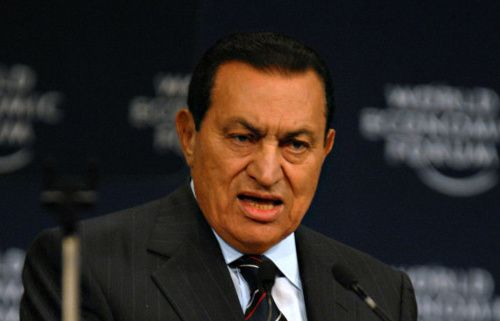
Should he be toppled? ...I think the question to ask is whether Egypt's Mubarak is genuinely pro-American? Caroline Glick offers the definitive analysis of Egypt's foreign policy interests in the Middle East: "The Pragmatic Fantasy." The fantasy is that Israel's pragmatists believed their vision would best be achieved by allying with Israel's idealists. The reality is that nothing could was gained from the alliance (the Camp David Accords set back Israel's security, for example):
Even toppling regimes that were clearly anti-American -- from the Soviet Union to Saddam Hussein's Iraq -- resulted in power vacuums and instability, giving rise to new problems that had been obscured by the heavy-handedness of the ousted regimes. The benefits of toppling an anti-American government may outweigh the costs, and so one naturally wonders about the cost of toppling an ostensibly pro-American one. Were Mubarak's regime an obvious American enemy, such as Iran's, rooting for a revolution would be a no-brainer. But in Egypt, things are a bit more complicated.
Unlike the starry-eyed idealists, the so-called pragmatists have no delusions that the Arabs are motivated by anything other than hatred for Israel, or that their hatred is likely to end in the foreseeable future. But still, they argue, Israel needs to surrender.And she adds further, "Egypt has been the undisputed leader of the political war against Israel raging at international arenas throughout the world."
If Israel remains our main democratic friend in the region, American backing for Mubarak has been a disaster. We bought stability in an entrenched "secular" dictatorship on the leading edge of establishment jihad. So will regime change be an improvement? That depends. If the Islamists come to power it could unleash a rage of militant fanaticism around highly mobilized actors in the Muslim Brotherhood et al. (Glenn Reynolds worries about this.) But frankly, it's not clear that violent militants could take power if Mubarak flees. The Weekly Standard suggests that top members of the officer class stand in line to power. The government is a "Free Officers regime" that is "unlikely to fold in the face of 50,000 protesters throwing rocks." That's not much change, and no improvement in the prospects for democracy. And that makes sense, considering Washington's disgusting approach so far. As I noted last night, the Obama administration has held its ground on the wrong side of history and democracy since taking office. And while no one really knows who's driving some of the most newsworthy reports out of Eygpt (attacks on Mubarak's party headquarters, government gun battles with RPG-armed "protesters" in Northern Sinai, etc.), it's without doubt that years of dictatorship have engendered powerful demands for freedom. The New York Times reports on that, "Egyptians’ Fury Has Smoldered Beneath the Surface for Decades." And I think ultimately the freedom agenda that drove U.S. foreign policy before the Obama interregnum is being reaffirmed, and freedom's a big step from dictatorship. Peter Wehner puts things in context, "Vindication for Bush’s Freedom Agenda":
During the course of the Bush presidency, his “freedom agenda” was criticized from several different quarters, including foreign-policy “realists” who believed that the bargain Bush spoke about — tolerating oppression for the sake of “stability” — was worth it.So, topple Mubarak. We'll be sorting through the implications of global jihad either way, and without much help from Hussein Obama.
It wasn’t. The core argument Bush made, which is that America must stand firm for the non-negotiable demands of human dignity — the rule of law, limits on the power of the state, respect for women, private property, free speech, equal justice, and religious tolerance — was right. No people on earth long to live in oppression and servitude, as slaves instead of free people, to be kept in chains or experience the lash of the whip.
How this conviction should play itself out in the real world is not self-evident; the success of such a policy depends on the wisdom and prudence of statesmen. Implementing a policy is a good deal harder than proclaiming one. Still, it seems to be that events are vindicating the freedom agenda as a strategy and a moral insight, as even the Obama administration is coming to learn.
In any case, my earlier essay is linked at New York Times, "How Do You Solve a Problem Like Mubarak?"
And from this morning, "Army on Streets of Egypt — UPDATED!!"